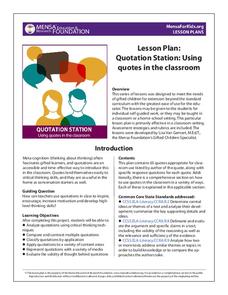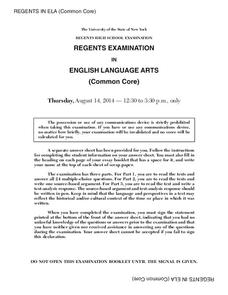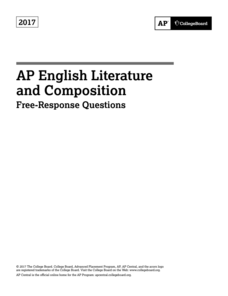Curated OER
My Name is___________.
Read to gain an understanding of the author's intent or purpose. Learners analyze a persuasive text, identify the author's purpose, and evaluate the claims used as support. They then compose a persuasive essay of their own.
Curated OER
Frederick Douglass Expository Reading Guide
Help your high schoolers navigate the cross-curricular text Narrative of the Life of Frederick Douglass with this reading guide. The questions guide learners through composing a summary of any given chapter in the text. In addition,...
Idaho State Department of Education
Lessons for Social Studies Educators
Point of view, purpose, and tone: three concepts readers of primary and secondary source materials must take into account when examining documents. Class members view a PowerPoint presentation and use the SOAPS strategy to identify an...
K20 Learn
Annotating a Text: Style and Syntax
New ReviewIf you have a favorite author, you probably recognize their style. Conduct a close read of the text, marking it up as they go. Collaborative sharing time and a summary writing prompt follow the main activity.
K20 LEARN
Between The Lines: Inferences In The Narrative Life Of Frederick Douglass Excerpt
Good literature can be much like an iceberg requiring readers to presume that the bulk of the meaning may be inferred to be found below the surface. Here's a lesson that asks scholars to conduct a close reading of passages from The...
College Board
2003 AP® English Language and Composition Free-Response Questions
How does perspective change a person's view? Scholars view different perspectives as they compare the styles of two different authors describing a flock of birds. Writers also create essays in response to entertainment ruining society...
Southern Nevada Regional Professional Development Program
The Columnist Project
Imagine a list that includes Alan Abelson of Baron's, Bob Woodward of the Washington Post, and Mother Jones. High schoolers select a national columnist, read and annotate five columns by this author, noting the rhetorical strategies,...
Curated OER
Is That a Fact?
Investigate popular scientific claims and gather evidence to defend or argue against an author's stance. Writers synthesize information and compose their own "Really?" columns modeled after those found in the weekly "Science Times"...
Dream of a Nation
Writing a Narrative Essay
Imagine using narrative essays to encourage change. This multi-week unit plan does just that. After reading a series of articles from Tyson Miller's Dream of a Nation: Inspiring Ideas for a Better America, class members examine the...
K20 LEARN
Watch Your Tone: Tone Analysis Through Music And Nonfiction
Identifying the tone of a piece of writing or the author's attitude toward the subject matter can be difficult for learners. Simplify the process with a lesson that begins with skits, moves to songs and their lyrics, and then to passages...
Shmoop
ELA.CCSS.ELA-Literacy.RL.11-12.3
Identifying an author’s choice, especially choices that concern craft and literary devices, is a difficult skill to teach. Here's an activity that will make your job easier. The resource breaks down how to teach the skill to novice,...
Curated OER
The Final Word
Although this lesson plan is based on “Final Word,” Craig Wilson’s USA Today column, the strategies could be adapted to any local columnist. After reading three articles independently, groups share observations about content and style...
MENSA Education & Research Foundation
Quotation Station: Using Quotes in the Classroom
An informative list compiled with quotes, authors, and discussion questions, along with 20 out-of-the-box application ideas, make up the collection of lessons geared to spark dialogue and creative thinking about quotations.
Curated OER
Strong Convictions
How can the rhetorical structure of an editorial help to develop its argument? Use this New York Times editorial to emphasize the importance of structure in a piece of informational text. Adolescent writers then use the editorial as a...
BW Walch
Unexpected Family History
The history of the northern states' involvement in the slave trade is not widely known. This resource uses the PBS documentary, Traces of the Trade, and the nonfiction book, Children of the New England Slave Trade, to examine this aspect...
Maryland Department of Education
The Concept of Diversity in World Literature Lesson 1: Unit Introduction
To launch a unit study of the concept of diversity in World Literature, class members compare Chinua Achebe's essay, "An Image of Africa: Racism in Conrad's Heart of Darkness" and Richard Rodriguez's essay, "The Chinese in All of Us: A...
Turabian Teacher Collaborative
Parts of Argument II: Article Critique
Break down the parts of argumentative writing with a critical thinking activity. High schoolers read an article of your (or their choice), and use a graphic organizer to delineate the ways the author structures his or her arguments.
Fluence Learning
Writing About Informational Text: Political Parties
To demonstrate their ability to craft an analysis of informational text, class members read excerpts from James Madison's "The Federalist No. 10," from George Washington's Farewell Address, and from Thomas Jefferson's First Inaugural...
New York State Education Department
English Language Arts Examination: August 2014
Tired of searching for complex passages suitable for high school level assessments? A challenging examination includes numerous complex text excerpts as well as question items to match them. Learners analyze literary elements, author's...
Northern Lights Special Education Cooperative
Lessons from The 7 Habits of Highly Effective Teens
As part of a study of Sean Covey, the author of The 7 Habits of Highly Effective Teens learners write autobiographical e-mails, hold discussions, create a collage, and compose a personal mission statement. Pupils then have a chance to...
College Board
2001 AP® English Language and Composition Free-Response Questions
Do pictures really last longer? A prompt from the 2001 AP® English Language and Composition Free-Response Questions asks scholars to analyze the opinion that photography actually limits people when it comes to understanding the world....
College Board
2002 AP® English Language and Composition Free-Response Questions
It is not what you say but how you say it. Scholars use an essay prompt from the 2002 AP® English Language and Composition Free-Response Questions to analyze how an author uses language to describe her past. They also support or argue a...
College Board
2002 AP® English Language and Composition Free-Response Questions Form B
"Don't go forth today." Why would Caesar's wife not persuade him to stay home? Scholars read an excerpt from the play Julius Caesar and write essays on why Caesar listened to Decius rather than his wife. Pupils then write two more essays...
College Board
2017 AP® English Literature and Composition Free-Response Questions
Music brings back a memory. One prompt from the 2017 AP® English Literature and Composition Free-Response Questions asks scholars to read a poem and write essays analyzing the relationship between music and the author's memories. Two...
Other popular searches
- Authors Purpose
- Author's Purpose
- Author Study
- Authors Point of View
- Authors Purpose Powerpoint
- Authors Purpose Mini Lesson
- Author Research
- Authors Purpose Passage
- Georgia Authors
- Authors Study
- Teaching Author's Purpose
- Student Authors

























